While cases have been on a continuous rise in India due to the COVID-19 pandemic, a study by the Indian Institute of Technology (IIT) Bhubaneswar and the All India Institute of Medical Sciences (AIIMS) has warned that the disease may accelerate as the monsoon and winter seasons progress.
The assumption based on the study is made in relation to the drop in temperatures the country has observed since the arrival of the monsoon season. However, the study remains to be peer-reviewed.
Professor V Vinoj of IIT Bhubaneswar's School of Earth, Ocean and Climatic Sciences said, "The rain will bring down the temperature and cool the atmosphere, which will also indicate the arrival of the winter season. This will create an environment for COVID-19 to spread further in the country."
Read more: Skin rashes also a symptom of COVID-19
Apart from Professor Vinoj, Bijayani Behera, Doctor (Department of Microbiology) of AIIMS Bhubaneswar, who was also involved in this study, said that the lowering of temperature and comparative lowering of humidity increases such health crises in several studies in the past as well.
According to media reports, Professor Vinoj said that this study analysed COVID-19 cases that had occurred in 28 states of the country between April and June. They reported that as the temperature increases, the transmission of the virus declines based on their analysis. "Studies show that temperature and comparative humidity have a significant effect on the growth rate and doubling time of the disease," he said.
Read more: Viral shedding
The doubling time refers to the number of days it takes for the number of active cases or positive infections to double its existing numbers. "A drop in temperature reduces cases by 0.99 percent. This also increases the doubling time by 1.18 days. This means a decrease in the spread of the virus," the professor observed.
The study also suggests that the comparative increase in humidity also reduces the growth rate and doubling time of COVID-19.
Researchers associated with the study also said that this study has not been done during high humidity and winter seasons, which calls for more analysis on this matter, in order to get an accurate assessment of the effect on the spread of the virus due to changes in the weather.
Read more: Timeline of India’s superspreader events
In addition, the study also analyses the effect of solar radiation on the transmission of the coronavirus named SARS-CoV-2. Explaining what the researchers found out in this, Professor Vinoj said, "We have found that like higher temperatures, solar radiation reduces the transition on the surface more affected and also increases the doubling time."
Based on the results, the study has clarified that since transmission of COVID-19 is expected to increase in winter, it may be a major challenge for health workers and policy makers (governments) to limit its spread in case a second wave of the disease takes over.


















